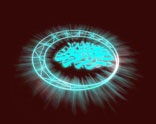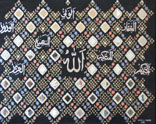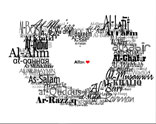Light Within Me
Allah and His Glory
It is clear from what we have so far said about 'bismillah' that the 'ba' in it is not for causation, as some grammarians say. In fact in the matter of doings of Allah there is no question of cause and effect. The best way of expressing the relationship between the Creator and the created is that which is found in the Qur'an. At some places this relationship has been described as glorification: 'Your Lord revealed His glory' and at some others as 'manifestation'. It has been said about Allah that 'He is the First and the Last, the Explicit and the Implicit'. This relationship is different from that of cause and effect, which implies a sort of tendency that is not appropriate to Allah, and therefore it is not a proper expression of the relationship between Allah and the existing things.
For this purpose we have either to expand the meaning of causation to include glorification and manifestation or to say that the 'ba' in bismillah is not for causation and that 'with the name of Allah' means with His manifestation or with His glorification. Therefore Bismillah al-Hamdu lillah' does not mean that Allah's name is the cause and his praise is the effect. Anyway, as far as I remember the words, sababiyyat or 'illiyat (cause, effect, causation) are not mentioned anywhere in the Qur'an and the sunnah (traditions). These words are merely philosophical terms used by the philosophers. In this sense the Qur'an and the sunnah have used the words of Khalq (creation), Zuhur (manifestation), Tajalli (glorification) etc.
There is another aspect of bismillah. We have a report about the dot under the 'ba'. I wonder whether this report is mentioned in any authentic book. Apparently it is not. Anyway, Imam Ali is reported to have said: 'I am the dot under the 'ba' of bismillah. If this report is mentioned anywhere, it may be interpreted in the following way: The 'ba' signifies absolute manifestation. The dot signifies its first specification or determination, which lies in the state of wilayat. If this report was true, the Commander of the Faithful might have meant that as the dot determined the 'ba', similarly the state of universal 'wilayat' is the first determination of the Absolute Manifestation. The name is synonymous with absolute glory. It is primarily determined by the Wilayat of the Holy Prophet, Imam Ali etc. This fact is true even if it is not mentioned in any authentic book. The first and primary determination of absolute glory is the highest stage of existence and this highest stage of existence is the same as the stage of absolute wilayat. As a matter of fact a divine name is sometimes a symbol of the state of self. The comprehensive name of this state of self is Allah. Sometimes a divine name is the symbol of the manifestation of some divine attribute such as beneficence, mercy etc. All these names are the reflections of the Exalted Name. Some of these names are the names of the state of self, some of the reflections of the glory of names and some of the reflections of the glory of doings. The names of the first category are called the state of uniqueness; the names of the second category are called the state of oneness and the names of the third category the state of will. All these are the terms used by the mystics. The last three verses of the Surah al-Hashr (59:22-24)108 perhaps hint at this division of the divine names:
(i) ﴾He is Allah, there is no other deity but He, the Knower of the invisible and the visible. He is the Beneficent, the Merciful﴿.
(ii) ﴾He is Allah, there is no other deity but He, the Sovereign Lord, the Holy One, Peace, the Keeper of Faith, the Guardian, the Majestic, the Compeller and the Superb. Glorified be Allah from all that they ascribe as partners to Him﴿.
(iii) ﴾He is Allah the Creator, the Shaper out of naught, the Fashioner, His are the most beautiful names. All that is in the heavens and the earth glorifies Him and He is the Mighty, the Wise﴿.
Possibly these three verses hint at the three states of the divine names as mentioned above. The first mentions the names appropriate to the state of self. The second verse contains the names appropriate to the reflections of the glory of names. The third verse has the names suitable to the reflection of the glory of doings. Thus there are three stages of divine glorification: the stage revealing self-glory for self, the stage of revealing glory at the stage of divine names and the stage of revealing glory at the stage of manifestation. He is the First and the Last is perhaps the negation of the existence of any other being. He is the First and the Last, the Explicit and the Implicit. This shows that it is He who is manifestation, not that manifestation is from Him, for 'He is the First and the Last, the Explicit and the Implicit.'
Glory is Not Separate From the Glorious
There are several degrees of the revealing of glory, but in no case glory is separate from the master of glory. It is an idea difficult to conceive, but once you conceive it, it is easy to believe it. It is also possible that Allah is the name of divine glory at the state of divine attributes. In this case 'ism' in bismillah will denote the revealing of the overall manifestation of glory. Even in this case it will not be difficult to apply the two possibilities mentioned by us earlier, for Allah's attributes are not separate from His self or essence. In this connection it is to be pointed out that sometimes we look at an event from the point of view as to what our perception says; sometimes from the point of view as to what our intellect says; sometimes from the point of view as to what impression our heart has formed; and sometimes we witness the event at the stage of its actual reality. This rule applies to all spiritual matters.
The farthest limit of our perception is either intellectual perception or argumentative or semi-argumentative perception. We perceive things according to our intellectual capacity. In spiritual matters the lowest degree of our perception should be that we come to understand that there is Allah and His glory. As a matter of fact whatever method of perception we use, we cannot go beyond this limit.
The utmost limit of our perception is either rational perception or argumentative and semi-argumentative perception. We perceive things according to our intellect only. As far as the questions relating to the knowledge of Allah are concerned, the main stage of knowing Him is just to understand that there is Allah and His glory. In fact whatever method of perceiving Him we employ, our perception cannot go beyond this limit.
His Being And His Glory Are the Real Truth
That is the main question. As for the nature of His glory at the various stages of His essence, His attributes and His actions, the verses we have quoted above indicate only that "He is the First and the Last and He is the Explicit and the Implicit". The real truth is only that there is no existence besides Allah. In fact it is meaningless to imagine that besides Allah there can be any existence. Sometimes we calculate according to our understanding what our perception is, what our intellect says, whether our rational perception has so firmly been established in our heart that it may be named faith, and whether we have started our spiritual journey in the right direction so that it may be called irfan or gnosis. Anyhow, it is all a matter of our perception rather than that of actualities.
The Real Truth Is Nothing But He
If we look into the question deeply, we come to the conclusion that there is nothing but Allah and that His glory is not but He himself. To illustrate this truth we cannot conceive of any example which may exactly fit in with it. The simile of shadow and the thing casting shadow is defective.
The relation between Allah and His glory can best be illustrated by the example of the Sea and its waves.
Perhaps this is the closest similitude. As we know, the waves of the sea are not separate from the sea itself, but still the sea is not the waves, although the waves are the sea. When the sea vibrates, the waves rise in it. At that time the sea and its waves appear to us to be separate from each other. But the waves are a temporary phenomenon. They are again merged in the sea. In fact the waves do not exist independently. This world is also like a wave. Anyhow, even this similitude is not perfect, for no similitude can properly illustrate the relation between Allah and His creation. We talk only as we perceive. There are two aspects of this question. On the one hand there are some general conceptions like the names of Allah, the names of His attributes and His actions and some stages and stations. These are the conceptions we can perceive. The second stage is that of adducing arguments to prove that Allah and His glory are not separate from each other. To prove this it is said that Allah is pure and absolute existence that can in no way be qualified or limited, for an existence qualified or incomplete in any way cannot be absolute. The absolute existence must be perfect, unlimited and free from all restrictions and deficiencies. The attributes of Absolute Existence must also be absolute and unspecified. Neither Allah's mercifulness is specified or limited nor His compassionateness nor His divinity.
Lack of Any Excellence Means Limitation
As Allah is absolute light and unqualified existence, He must automatically combine in Himself all excellences, for the lack of any excellence would mean specification and restriction. If there were a slightest deficiency or defect at the stage of His essence, the term absolute would not be applicable to Him. He would be imperfect and as such would not be self-existing, because absolute excellence and absolute perfection are essential for being self-existent.
When we think about Allah according to our imperfect mental capacity, we find that Allah is the name of that Absolute Being who has all beautiful names and attributes and who combines in Himself all excellences, and that everything else is nothing but a reflection of His glory. He is Absolute and unqualified perfection. If there were slightest deficiency in Him, He would become a possibly existing being instead of being an essentially existing Being, as He is. He combines in Himself all the excellences and meritorious qualities. He is a pure and unspecified existence. Every existence is His. He is everything but in an unspecified manner and by the way of absolute perfection. As His names are not separate from His Being, the names of His attributes are also the names of His essence. All the characteristics pertaining to Allah, pertain to Rahman (Merciful) also. Rahman being absolute perfection and absolute mercy, has all the excellences of existence. The Qur'an says: ﴾Call Allah or call Rahman﴿ (Surah al-Isra', 17:110). In another verse it says: ﴾Call Him by any name, for all the beautiful names are His﴿. (Surah al-A'raf, 7:180) Allah, Rahman, Rahim and all other names of Him are good and beautiful. Each of them combines all His attributes. He being Absolute, there is no disparity between Him and His names or between one of His names and another.
Allah's beautiful names are not like the names we give to different things for different considerations. His glory and His manifestation are not two different aspects of Him. His manifestation is exactly His glory and His glory exactly His manifestation. Even this expression is defective. Absolute existence means Absolute perfection and Absolute perfection must be absolute in every respect. Therefore, all His attributes are absolute. No disparity of any sort can be imagined between His essence and His attributes.
Observation is a Step Further than All Arguments and Proofs
It is often said: "There is no proof of such and such thing" or "Reason says so". A Gnostic is reported to have said: "Wherever I went, this blind man also arrived there with his stick. By 'the blind man' this Gnostic meant Abu Ali Sina (Avicenna). What he wanted to say was that the person who perceived truth by means of his arguments and cold reasoning could be compared to a blind man who found out his way by means of his stick. This Gnostic meant to say: "Wherever I reached by means of my vision and gnosis, this blind man (Avicenna) also reached there rattling his stick, that is by means of his logical arguments".
People Depending On Arguments Are Blind
The people depending on arguments are blind because they lack the power of vision. Although they have proved unity of Allah and other questions relating to it by means of their arguments and have also proved that the source of Existence is Absolute Perfection, yet what they say is still a matter of arguments, behind the walls of which these people are unable to see anything. With a great deal of effort the heart perceives that the Essentially Existing Being is pure existence and that He is everything. Still the heart remains like a child who needs to be spoon-fed at every step. He perceives the rational questions by means of arguments, need, repetition of these arguments and has to make strenuous struggle before his findings are firmly established in his heart.
Faith Means Cordial Perception
When it is cordially accepted that Allah is pure existence as well as all perfection, this conviction becomes a faith. Prior to that it was only a rational idea obtained by means of arguments. Later it produced a particular conception. When the heart accepted that conception as a truth either by means of rational arguments or through Quranic teachings, it became a faith. Intellect discovers the truth and teaches it to the heart. When as the result of repetition and mental exercise it is firmly established in the heart that there is nothing in this world except Allah, that idea becomes a faith or an implicit belief. Although the stage referred to in the Qur'an by the words: so that my heart may be at ease", is a stage lower than the vision of the Prophets, yet it is a stage. But the vision of the beauty of Allah is a far higher stage. Glory of Allah was revealed for Prophet Musa. The Qur'an says: ﴾When his Lord revealed His glory to the mountain﴿. In connection with the story of Prophet Musa the periods of 30 days and 40 days and the subsequent events are significant and worth consideration. When Prophet Musa departed from the house of his father-in-law, Shu'ayb, after traversing a little distance he said to his wife: "I feel that there is a fire". His wife and children did not see at all the fire which he felt. Prophet Musa said: "I am going so that I may bring a live coal from it for you."
When he approached the fire, he heard a call saying: "Surely I am Allah." He heard this voice from the fire which was ablaze in a tree. This sort of vision was acquired by the blind man by means of his stick and the gnostic by means of his heart. But Prophet Musa had that vision with his eyes.
The Truth is Higher Than What We Say and Hear
We speak about the truths, but they are higher than what we can say about them. "Surely I am Allah". Nobody except Prophet Musa could see the Light of the divine glory that was revealed to the tree. Similarly nobody could know the nature of the revelation that was received by the Holy Prophet, Muhammad. The whole Qur'an used to be revealed to his heart at one time. How? Who knows? If the Qur'an is what we have, consisting of 30 parts, then it cannot be revealed all at once to an ordinary heart.
Heart Also Means Something Quite Different from What We Understand
In this context the heart is different from what we ordinarily understand. The Qur'an is a truth and this truth is revealed to the heart. The Qur'an is a secret - a guarded secret. It must descend from its high position so that it might be revealed to the heart of the Holy Prophet. Then it must come down further so that it could be understood by others also. The same is true of man. Man is also a closed secret. From what we can see man appears to be an animal and for that matter, an animal lower than many other animals. But the distinguishing feature of this animal is that it can attain humanity and by traversing various stages of perfection can reach the stage of absolute perfection. Man before his death can become what is difficult even to imagine.
What We Feel Are Qualities and Forms
The whole man is a secret. It is difficult to say what we apparently see in this world, for we cannot perceive bodies or substances. All that we perceive are forms and qualities only. For example, our eyes see a color. Our ears hear a sound. Our tongue feels a sensation of taste. Our hands feel the things by touching them. All these are forms and qualities. But the actual body is nowhere. When we describe a thing, we mention its length, breadth and depth. Length, breadth and depth are all forms only. We say that such and such thing has attraction. But attraction is also a quality only. Whatever qualities of a thing we may describe, they are all mere forms. Then where is the body? The body is a secret - a shadow of the divine secret. What we know is only names and qualities, otherwise everything in this world is unknown. Perhaps it is this conception to a degree of which has been described by the Gnostics as ''invisible though apparently visible'', for in this world things are visible and invisible at one and the same time. Only those things are invisible which we can neither see nor can we perceive. If we want to describe a thing we can do no more than mention its name, qualities and characteristics. Man cannot perceive a thing which is a shadow of the Absolute Secret, for human perception is defective. Only that man can perceive things fully who through his 'Wilayat' has attained that position.
* By Ayatullah Ruhullah Khumayni.




















